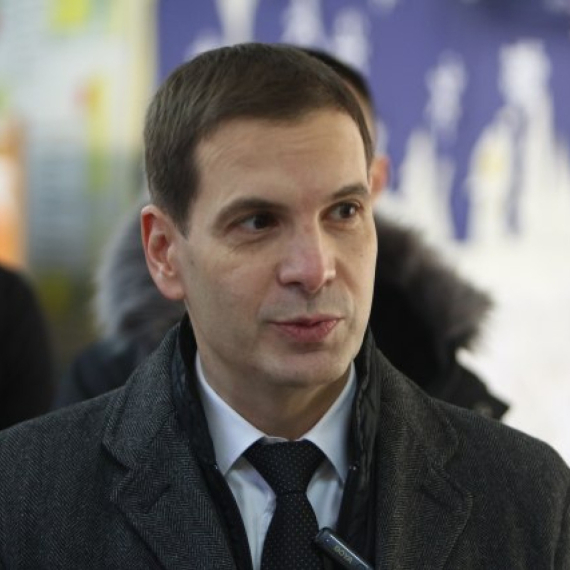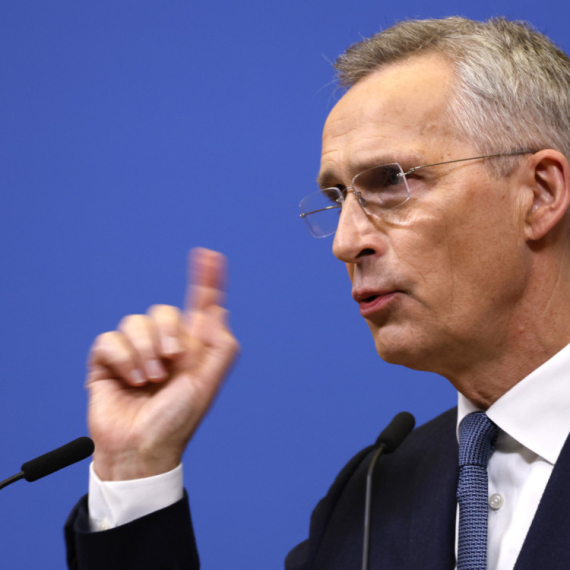Serbian prime minister: Let's hope EU survives
Serbian Prime Minister Ivica Dačić has expressed his hope that the EU would survive until the time that Serbia was ready to join the organization.
Friday, 12.10.2012.
17:34

BUDAPEST Serbian Prime Minister Ivica Dacic has expressed his hope that the EU would survive until the time that Serbia was ready to join the organization. Dacic made the statement on Friday in Budapest, after a meeting with his Hungarian counterpart Viktor Orban. Serbian prime minister: Let's hope EU survives Both prime ministers welcomed the decision of the Nobel Committee to make the European Union (EU) the recipient of this year's peace prize, and added they hoped Serbia would, in the foreseeable future, become a member. "When it comes to the Nobel Prize, I can only congratulate the EU. The EU is a realization of an idea about a joint family of European nations. We will see in the coming years how well it will be able to preserve itself. I hope it will survive until we join," Dacic told reporters. Orban for his part remarked that a state such as Serbia, which is not yet a member, "perhaps has the best insight into the degree to which this community of states is an ideal of a peaceful coexistence and realization of a joint interest in the space that was shaken by two world wars". "We should think about the founders, because today the EU seems like a natural formation, but during the founding period, that was not the case. It took courage and resolve, so the Nobel Prize belongs to the founders," the Hungarian prime minister stated. Orban also "jokingly remarked" that one twenty-seventh of the money award associated with the Nobel accolade "belonged to his country". Ivica Dacic (Tanjug, file) "Intensify ties" The two prime ministers on Friday said there was a need to intensify economic and political relations, and marked the beginning of preparations for an upcoming summit of the two governments by meeting in Budapest. Orban said that "the entire European Union had high expectations of the new Serbian government". Our interest is that all our neighbours become EU members, and our Serbian friends can count on us, he told a joint press conference. Dacic thanked Orban for advocating that Serbia gets a date for the beginning of accession negotiations and becomes an EU member as soon as possible. He said that the two countries shared many mutual interests and a long common history. "What is common to us are our successes and failures, good and bad sides of the past, but we want our common future to be good," Dacic noted. The two officials also discussed the positions of the Hungarian community in Serbia and the Serbian community in Hungary, and Dacic pointed out that his government would continue to pursue a policy of good-neighborly relations with the Hungarian minority. Orban promised Dacic that the Hungarian government would choose a person for relations with the Serbian minority in order to have more efficient communication and resolve all the problems that the Serbs are facing in that country. "We have respect for the Serbs in Hungary, and I told the prime minister that the Serbs are an important and valuable community in our country. We are ready to consider their needs and interests at any time," Orban stressed. When it comes to potential for better economic cooperation, Dacic and Orban said they believed it could be improved significantly. Orban pointed out to the past, when Hungarians visited the former Yugoslavia and Serbia to shop and taste the western lifestyle, and he stressed that Serbia's potential could be redeveloped. "If someone has climbed a mountain, they will be able to do it again," he noted, adding that current differences in economic development were temporary. Dacic stated that Hungary was at the moment Serbia's 7th best trade partner, and that cooperation could intensify much further. In terms of travel, trade and capital flow, the two discussed the possibility of setting up new border crossings. Since Hungary has access to EU funds, it will take up a proportionally bigger financial load, especially regarding the crossing in Backi Breg, Orban noted. Hungarian reports were interested in the relations between the Serbian government and the provincial authorities in Vojvodina, and Dacic stated there would be talks with the Vojvodina executive council and assembly about running a joint national policy. The government wants to continue with the policy that guarantees Vojvodina's autonomy and its rights based on the Constitution and Vojvodina's Statute, Dacic explained. Tanjug
Serbian prime minister: Let's hope EU survives
Both prime ministers welcomed the decision of the Nobel Committee to make the European Union (EU) the recipient of this year's peace prize, and added they hoped Serbia would, in the foreseeable future, become a member."When it comes to the Nobel Prize, I can only congratulate the EU. The EU is a realization of an idea about a joint family of European nations. We will see in the coming years how well it will be able to preserve itself. I hope it will survive until we join," Dačić told reporters.
Orban for his part remarked that a state such as Serbia, which is not yet a member, "perhaps has the best insight into the degree to which this community of states is an ideal of a peaceful coexistence and realization of a joint interest in the space that was shaken by two world wars".
"We should think about the founders, because today the EU seems like a natural formation, but during the founding period, that was not the case. It took courage and resolve, so the Nobel Prize belongs to the founders," the Hungarian prime minister stated.
Orban also "jokingly remarked" that one twenty-seventh of the money award associated with the Nobel accolade "belonged to his country".
"Intensify ties"
The two prime ministers on Friday said there was a need to intensify economic and political relations, and marked the beginning of preparations for an upcoming summit of the two governments by meeting in Budapest.Orban said that "the entire European Union had high expectations of the new Serbian government".
Our interest is that all our neighbours become EU members, and our Serbian friends can count on us, he told a joint press conference.
Dačić thanked Orban for advocating that Serbia gets a date for the beginning of accession negotiations and becomes an EU member as soon as possible.
He said that the two countries shared many mutual interests and a long common history.
"What is common to us are our successes and failures, good and bad sides of the past, but we want our common future to be good," Dačić noted.
The two officials also discussed the positions of the Hungarian community in Serbia and the Serbian community in Hungary, and Dačić pointed out that his government would continue to pursue a policy of good-neighborly relations with the Hungarian minority.
Orban promised Dačić that the Hungarian government would choose a person for relations with the Serbian minority in order to have more efficient communication and resolve all the problems that the Serbs are facing in that country.
"We have respect for the Serbs in Hungary, and I told the prime minister that the Serbs are an important and valuable community in our country. We are ready to consider their needs and interests at any time," Orban stressed.
When it comes to potential for better economic cooperation, Dačić and Orban said they believed it could be improved significantly.
Orban pointed out to the past, when Hungarians visited the former Yugoslavia and Serbia to shop and taste the western lifestyle, and he stressed that Serbia's potential could be redeveloped.
"If someone has climbed a mountain, they will be able to do it again," he noted, adding that current differences in economic development were temporary.
Dačić stated that Hungary was at the moment Serbia's 7th best trade partner, and that cooperation could intensify much further.
In terms of travel, trade and capital flow, the two discussed the possibility of setting up new border crossings.
Since Hungary has access to EU funds, it will take up a proportionally bigger financial load, especially regarding the crossing in Bački Breg, Orban noted.
Hungarian reports were interested in the relations between the Serbian government and the provincial authorities in Vojvodina, and Dačić stated there would be talks with the Vojvodina executive council and assembly about running a joint national policy.
The government wants to continue with the policy that guarantees Vojvodina's autonomy and its rights based on the Constitution and Vojvodina's Statute, Dačić explained.


































Komentari 11
Pogledaj komentare